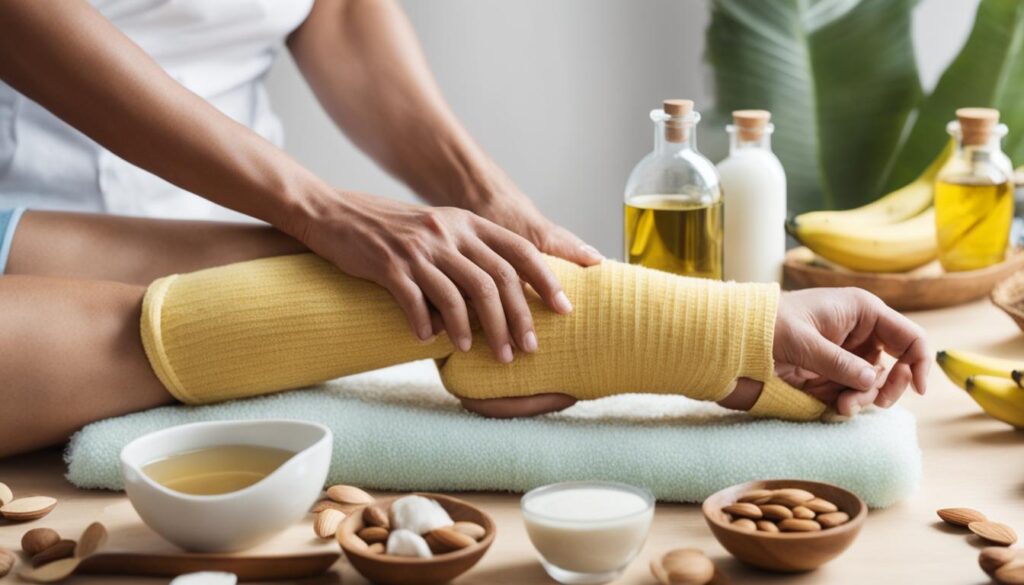Muscle cramps can be a common and painful problem that many people experience. They typically occur when a muscle tightens and cannot relax properly. Some common causes of muscle cramps include dehydration, staying in one position for a long time, and mineral deficiencies. Certain groups of people, such as older adults and those with nerve disorders or who overuse their muscles, are more prone to muscle cramps. However, in most cases, muscle cramps can be treated at home without the need for medical intervention. There are several effective home remedies that can provide immediate relief from leg cramps.
Key Takeaways:
- Leg cramps can be relieved with home remedies.
- Common causes of leg cramps include dehydration and mineral deficiencies.
- Stretching, massaging, and applying heat or cold can provide immediate relief from leg cramps.
- Staying hydrated is important to prevent leg cramps.
- If leg cramps are severe or persistent, it is important to seek medical attention.
Benefits of Massage and Heat Application for Leg Cramp Relief
The combination of massage and heat offers multiple benefits for relieving leg cramps:
- Relaxes the muscle and reduces muscle tension
- Increases blood flow to the affected area, promoting healing
- Alleviates pain and discomfort associated with leg cramps
- Reduces inflammation and swelling
- Improves flexibility and range of motion in the muscle
| Massage and Heat Application for Leg Cramp Relief | Benefits |
|---|---|
| Relaxes the muscle and reduces muscle tension | Relieves muscle cramping and discomfort |
| Increases blood flow to the affected area, promoting healing | Accelerates muscle recovery and reduces inflammation |
| Alleviates pain and discomfort associated with leg cramps | Provides immediate relief and improves overall well-being |
| Reduces inflammation and swelling | Reduces muscle soreness and promotes faster healing |
| Improves flexibility and range of motion in the muscle | Enhances muscle performance and reduces the risk of future cramps |
Note: If you have any pre-existing medical conditions or are unsure about using massage or heat therapy, it’s important to consult with a healthcare professional before trying these remedies.
Cold Application and Elevation for Leg Cramp Relief
Cold application can be another effective home remedy for natural relief from leg cramps. After applying heat to the cramped muscle, you can use an ice pack wrapped in a towel to further alleviate the pain and loosen up the muscle. The cold temperature helps reduce inflammation and numbs the affected area, providing quick relief for leg cramps.
In addition to cold application, elevating the cramping area can also help alleviate the cramp more quickly. If the cramp is in an area that can be elevated, such as the leg or foot, propping it up can promote better blood circulation and relieve the muscle tension. Elevating the leg or foot allows gravity to assist in reducing the cramp, providing natural remedies for immediate leg cramp relief.
Hydration for Preventing Leg Cramps
Staying hydrated is an essential preventive measure against leg cramps. Dehydration can contribute to muscle cramps, so drinking enough water throughout the day can help keep them at bay. When you are properly hydrated, your muscle cells stay hydrated as well, reducing the risk of muscle cramps.
Drinking fluids, especially when experiencing a cramp, can help the muscles contract and relax, providing relief from the cramp. To prevent leg cramps, make sure to drink an adequate amount of water daily, especially during physical activity or in hot weather. It’s important to listen to your body and stay hydrated to maintain optimal muscle function.
| Benefits of Hydration for Preventing Leg Cramps |
|---|
| 1. Reduces the risk of muscle cramps |
| 2. Keeps muscle cells hydrated |
| 3. Helps muscles contract and relax effectively |
| 4. Enhances overall muscle function |
Remember, when it comes to preventing leg cramps, proper hydration is key. By incorporating sufficient water intake into your daily routine, you can significantly reduce the occurrence of muscle cramps and promote overall muscle health.

Painkillers and when to seek medical attention for leg cramps
While most muscle cramps can be effectively treated at home using home remedies for leg cramp relief, there are certain cases where medical attention may be necessary. If you experience severe or persistent cramps, or if they are accompanied by severe pain or other concerning symptoms, it is important to consult a doctor.
“If your cramps are severe or persistent, or if accompanied by severe pain or other concerning symptoms, it is important to consult a doctor.”
A medical professional can assess your condition and determine if there is an underlying cause for your leg cramps that needs to be addressed. They may recommend further tests or treatments to alleviate your symptoms and prevent future episodes.
“Consulting a doctor can help identify any underlying causes for your leg cramps and provide appropriate treatment.”
If over-the-counter painkillers are needed for immediate relief from muscle cramps, common options like ibuprofen or paracetamol can be used. These medications can help reduce pain and inflammation, providing temporary relief from leg cramps.
“If pain persists, over-the-counter painkillers like ibuprofen or paracetamol can provide temporary relief from leg cramps.”
However, it is important to use painkillers as directed and consult with a healthcare professional if you have any concerns or if your symptoms worsen.
“Use painkillers as directed, and consult a healthcare professional if you have concerns or worsening symptoms.”
Knowing when to seek medical attention and utilizing painkillers appropriately can help individuals effectively manage and find relief from leg cramps. Remember to take care of your body and listen to its signals to ensure optimal health and well-being.
Conclusion
Leg cramps can be a painful and frustrating issue, but there are several effective home remedies for immediate relief. Stretching the cramped muscle, massaging it, and applying heat or cold can help relax the muscle and alleviate the pain. Elevating the affected area and staying hydrated are also crucial in preventing and managing leg cramps. Additionally, if over-the-counter painkillers are needed, options like ibuprofen or paracetamol can provide temporary relief.
However, it is important to remember that if the cramps are severe or persistent, seeking medical attention is recommended to rule out any underlying health issues. Consulting with a healthcare professional can provide valuable guidance and ensure proper treatment. By following these home remedies and getting appropriate medical assistance, individuals can find relief from leg cramps and regain their comfort.
Remember, natural ways to relieve leg cramps are often effective in providing immediate relief, but it is essential to address any underlying causes or seek medical advice when needed. By incorporating these home remedies into your routine and taking preventive measures, you can minimize the occurrence of leg cramps and enjoy a more comfortable life.
FAQ
Are there any home remedies for immediate leg cramp relief?
Yes, there are several effective home remedies that can provide immediate relief from leg cramps.
How can stretching help in relieving leg cramps?
Stretching the cramped muscle can help relax it and provide relief from the cramp.
How can massage and heat application provide relief from leg cramps?
Massaging the cramped muscle and applying heat can help relax the muscle and alleviate the pain.
Can cold application and elevation help in relieving leg cramps?
Yes, after applying heat to the cramping muscle, using an ice pack wrapped in a towel and elevating the affected area can further alleviate the pain and loosen up the muscle.
How does staying hydrated help prevent leg cramps?
Staying hydrated helps keep muscle cells hydrated, reducing the risk of muscle cramps. Drinking enough fluids can also help the muscles contract and relax, providing relief from the cramp.
Do painkillers help in relieving leg cramps?
Over-the-counter painkillers like ibuprofen or paracetamol can be used for relief from muscle cramps if necessary.
When should I seek medical attention for leg cramps?
If the cramps are severe or persistent, or if they are accompanied by other symptoms such as severe pain, it may be necessary to consult a doctor to rule out any underlying health issues.
What should I do if home remedies for leg cramp relief don’t work?
If home remedies do not provide adequate relief from leg cramps, it is important to seek medical attention for further evaluation and treatment.





